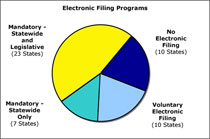|
States are making steady progress in electronic
filing. Since the publication of the first
Grading State Disclosure study in 2003, twelve
new electronic filing programs have been implemented;
seven states have mandated electronic filing
and five states have adopted new programs.
Since 2005, four states that previously required
electronic filing by statewide candidates expanded
the mandate to legislative candidates as well.
Thirty states now require candidates to file
campaign finance reports electronically.
Twenty-three states earned grades in the A
range, up from 17 in 2005. While no states
earned grades in the B range, five earned Cs
(one more state than in 2005) and the two states
that earned Ds in 2005 received the same grade
this year. The number of states in the F range
dropped from 26 to 20 since Grading State Disclosure
2005 was published. Because of the value placed
on mandatory electronic filing in the Grading
State Disclosure criteria, those states with
completely voluntary electronic filing programs
are included among the failing states.
- States
with the strongest electronic filing programs,
all receiving an A+ and tied for first place
in this category, are: Arizona; Florida;
Georgia; Hawaii; Illinois; Maryland; Massachusetts;
Michigan; Missouri; New York; Ohio; Oregon;
Rhode Island; Texas; and Washington.
- States
with no electronic filing (all tied for the
last place rank) are: Alabama; Idaho; Kansas;
Mississippi; Montana; Nebraska; North Dakota;
South Dakota; Vermont; and Wyoming.
Significant 2007 findings:
- 40
states have an electronic filing program
for candidate campaign finance reports;
- 30
states have a mandatory electronic filing
requirement;
- 23
of these states require electronic filing
by candidates for both statewide and legislative
office;
- 7
states require electronic filing for statewide
candidates only;
- 10
states have voluntary electronic filing
for statewide and legislative candidates;
- 35
states reported having adequate funds to
administer their electronic filing program
and 5 reported inadequate funding; and
- 10
states have no electronic filing program.
Significant changes since 2005:
- 1
state added a new, mandatory electronic filing
program. (South Carolina);
- 2
states added new, voluntary electronic
filing programs (Arkansas and New Hampshire);
- 4
states that previously had voluntary electronic
filing programs converted to mandatory
electronic filing for both statewide and
legislative candidates (Colorado, New Jersey,
Oklahoma and Tennessee);
- 1
state that previously only required electronic
filing for statewide candidates added mandatory
electronic filing for legislative candidates
(Missouri);
- 1
state that previously had a voluntary electronic
filing program added mandatory electronic
filing for statewide candidates (West Virginia);
and
- 6
states moved from failing to passing grades
in the Electronic Filing category (Colorado,
New Jersey, Oklahoma, South Carolina, Tennessee
and West Virginia).
Most
states require electronic filing for candidates
who reach a certain threshold of fundraising
or spending, with the threshold amount ranging
from zero (Arizona) to $250,000 (Connecticut).
Colorado’s new mandatory
program requires electronic filing by state-level
candidates with thirty or more reported transactions.
Five states currently have no electronic filing
program in place (Alabama, North Dakota, South
Dakota, Vermont and Wyoming); another five
states currently have no program in place,
but report progress in the development of new
systems (Idaho, Kansas, Mississippi, Nebraska
and Montana).
While
mandatory electronic filing requirements
are the ideal, and weighted heavily in this
study, ten states currently offer a completely
voluntary electronic filing option for candidates.
It is important to note that these states,
while receiving a grade of F in this category,
are outperforming those states with no electronic
filing program, as indicated in the rankings.
In 2007, disclosure agencies reported an
increase in voluntary electronic filing by
candidates, with an average of 47 percent
of statewide and 34 percent of legislative
candidates participating. By comparison,
in 2005, approximately 25 percent of statewide
candidates and 27 percent of legislative
candidates voluntarily filed campaign reports
electronically in their states.

click
image to enlarge
Electronic Filing Methods
Twenty
states offer a free, web-based filing system
and 20 states provide free filing software
for candidates; candidates in nine states can
utilize either filing method. Twenty-nine states
have developed and offer candidates a standard
filing format (technical specifications) which
is used to ensure that electronically-filed
reports are compatible with the disclosure
agency’s computer system, regardless
of the filing method or software used. In the
Grading State Disclosure 2007 survey, many
states reported improvements in training resources
and technical assistance available to electronic
filers.
Funding and Support for Electronic Filing
Programs
Adequate
funding is a critical component of electronic
filing programs; in addition to the resources
necessary to develop such a program, disclosure
agencies also require funding to maintain
and upgrade systems, and to provide support
and training to candidates. Most states recognize
the need to continue to provide a stable
funding stream that anticipates both program
growth and the need to adapt to new technology;
this year, 35 of the 40 states with electronic
filing programs reported having adequate
funding for their programs. However, nine
states reported funding as a primary barrier
to advancing their state’s disclosure
system.
Additionally,
disclosure agencies were surveyed on the
level and type of technical support available
for their electronic filing programs and
whether it is provided “in house” or
from outside consultants. Eighty-three percent
of state disclosure agencies reported having
access to adequate or strong technical support
and 50 percent reported having access to strong
technical support. It is noteworthy that of
those reporting strong technical support, 90
percent received either all or a portion of
their technical support from within their own
agency or department.
|